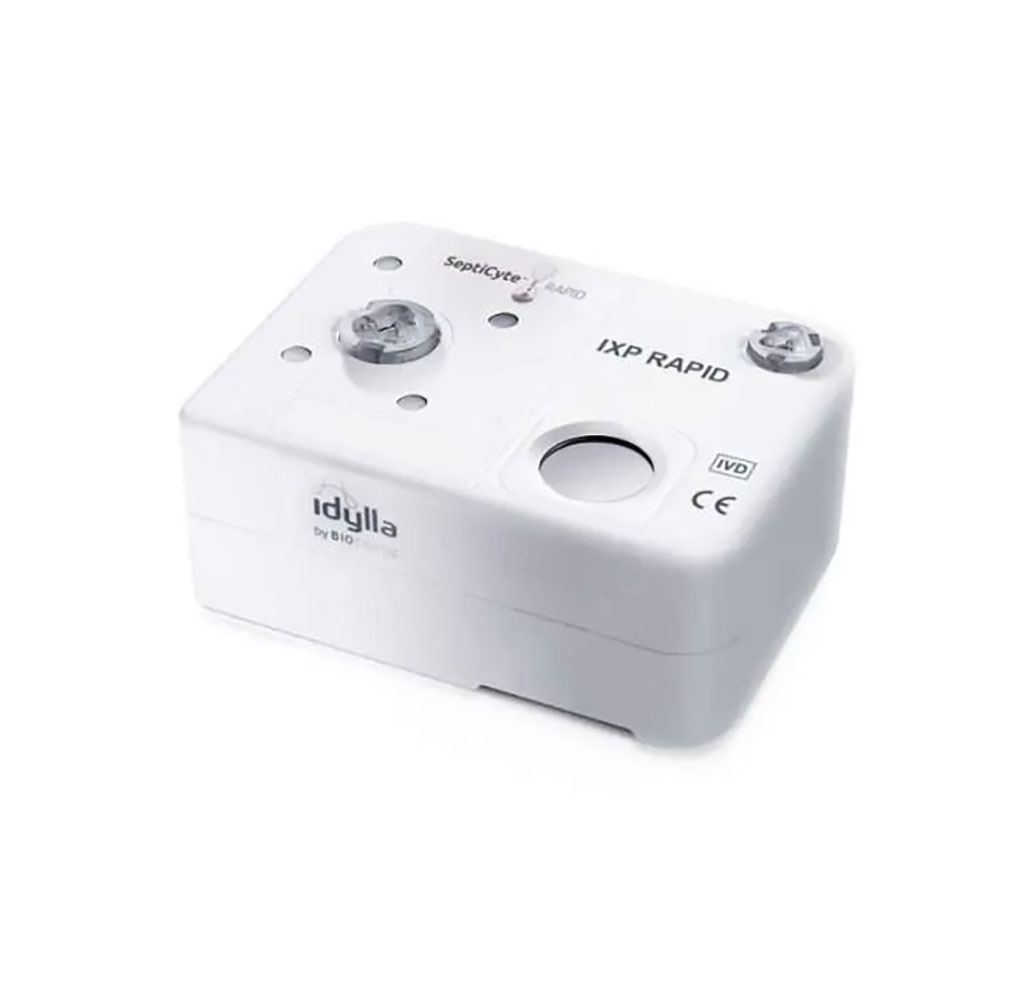Near-Patient Molecular Test Outperforms Other Rapid Measures for Sepsis Diagnosis
Posted on 22 Mar 2023
Sepsis is a life-threatening condition that can lead to organ failure and death, causing high in-patient costs for hospitals. Detecting sepsis early is crucial, and a quick sepsis test can make a significant difference between life and death. Overuse of antibiotics can also result in new health issues and antibiotic resistance among at-risk patient populations. Thus, early detection can help health professionals determine the most effective treatment plan quickly, including potential ICU admission. However, conventional blood tests for sepsis based on microbiological culture are not reliable or speedy enough. Now, a PCR-based test for sepsis has demonstrated that it can more accurately determine if an ICU patient has sepsis as compared to other rapid diagnostic methods.
SeptiCyte RAPID from Immunexpress (Brisbane, Australia) is a sample-to-answer, cartridge-based, host response molecular test for sepsis that uses reverse transcription polymerase chain reaction (RT-PCR) to quantify the relative expression levels of host response genes isolated from whole blood. SeptiCyte RAPID is utilized alongside clinical assessments, vital signs and laboratory findings to help distinguish infection-positive (sepsis) from infection-negative systemic inflammation response syndromes in patients with organ dysfunction and high infection risk. SeptiCyte RAPID generates a score (SeptiScore) that falls within four discrete interpretation bands depending upon the increasing possibility of sepsis.

In a new study, SeptiCyte RAPID proved more accurate in determining sepsis in ICU patients than other rapid diagnostic methods, including quick Sequential Organ Failure Assessment (qSOFA). SeptiCyte RAPID in conjunction with qSOFA was statistically significant at distinguishing higher as well as lower mortality sepsis patients in the ICU cases from those without sepsis and could act as the first step in diagnostic pathways for sepsis. For the study, the researchers utilized retrospective and prospective data from clinical trials involving 419 critically ill patients with systemic inflammatory response syndrome who had been admitted to the ICU for suspicion of having sepsis. A panel of three clinicians performing expert diagnosis classified the patients as sepsis positive, sepsis negative or indeterminate, and calculated a full qSOFA score for 173 patients.
SeptiCyte RAPID distinguished between sepsis positive patients and sepsis negative patients regardless of qSOFA stratification (AUC 0.82 in qSOFA ≥2, AUC 0.81 in qSOFA < 2) and also outperformed several conventional rapid diagnosis methods such as SOFA, lactate, PCT, among other parameters. Additionally, SeptiCyte RAPID outperformed other sepsis markers in differentiating higher and lower mortality ICU cases from patients that did not have sepsis. SeptiCyte RAPID is intended for in-vitro diagnostic use and runs on the Biocartis Idylla Platform. SeptiCyte RAPID is CE Marked as a near-patient sample-to-answer test in European Union (EU) member countries and those harmonized with the EU IVD Directive (98/79/EC). As of November 2021, the test has been markers FDA cleared for use in hospitalized patients suspected of sepsis.
"This study demonstrates that SeptiCyte RAPID is not only a more accurate sepsis diagnostic tool compared to other conventional rapid diagnosis methods but can serve as a crucial first step in the diagnostic and treatment paradigm for patients suspected of sepsis using the Sepsis-3 framework. While conventional sepsis diagnosis is based on parameters such as qSOFA, PCT, lactate, white cell count, respiratory rate and temperature, SeptiCyte RAPID measures the mRNA expression of two genes that are specific to sepsis," commented Dr. Richard Brandon, Chief Scientific Officer of Immunexpress. "Emergency medicine outcomes rely on quick decision-making and action. SeptiCyte RAPID is uniquely positioned to provide clinicians in this field with actionable results in less than an hour and may be utilized early in the diagnostic pathway to determine the likelihood of sepsis. In conjunction with additional parameters of qSOFA and SOFA scores, SeptiCyte RAPID may aid clinicians in predicting the likelihood of septic shock or other unwanted health outcomes."
Related Links:
Immunexpress














